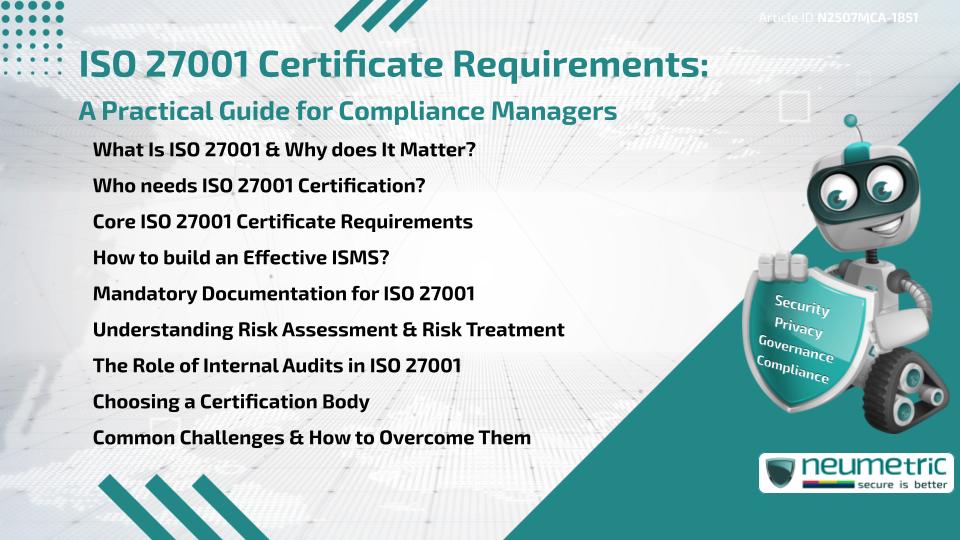Table of Contents
ToggleIntroduction
Achieving ISO 27001 Certification is a key milestone for organisations aiming to prove their commitment to Information Security. But for Compliance managers, navigating the detailed ISO 27001 certificate requirements can be overwhelming. This guide simplifies the process by explaining what is expected, how to prepare & what common pitfalls to avoid.
Whether you are starting from scratch or aligning your existing Policies, understanding ISO 27001 certificate requirements is essential to achieving & maintaining Compliance.
What Is ISO 27001 & Why does It Matter?
ISO 27001 is an international Standard for implementing an effective Information Security Management System [ISMS]. It helps organisations protect Sensitive Data, reduce Risks & build Stakeholder trust.
Being ISO 27001 certified proves that your organisation follows globally accepted security Best Practices. It is particularly crucial for sectors such as Healthcare, Finance & SaaS where Data Protection is mandatory.
Who needs ISO 27001 Certification?
Any organisation that processes, stores or transmits sensitive information can benefit from ISO 27001. This includes small startups, multinational corporations & even non-profits.
ISO 27001 Certification is often a business requirement in B2B deals, particularly in Europe & North America. It reassures clients that your Information Security Controls are mature & reliable.
Core ISO 27001 Certificate Requirements
ISO 27001 certificate requirements are outlined in two parts: Annex A Controls & the main body of the standard. Together, they provide a comprehensive Framework.
Key Elements Include:
- Context of the organisation: Define internal & external issues & Stakeholders.
- Leadership & commitment: Assign roles & responsibilities, including top-level endorsement.
- Planning: Identify & address Risks & opportunities.
- Support: Ensure proper resources, awareness & communication.
- Operation: Implement Policies & procedures.
- Performance evaluation: Monitor & measure ISMS effectiveness.
- Improvement: Take Corrective Actions & continually improve.
How to build an Effective ISMS?
An ISMS is the foundation of your ISO 27001 journey. It should be:
- Tailored to your business context
- Supported by leadership
- Based on ongoing Risk Management
Start by creating an Information Security Policy, set clear objectives & assign responsibilities. Then develop procedures & guidelines that address your identified Risks.
For further insights, review NIST’s Cybersecurity Framework.
Mandatory Documentation for ISO 27001
ISO 27001 requires a mix of Policies, Procedures, Records & Plans. Some of the essential documents include:
- Information Security Policy
- Risk Assessment methodology
- Statement of Applicability [SoA]
- Access Control policy
- Incident Response Plan
- Internal Audit reports
Maintaining accurate documentation not only supports audits but also ensures consistent practices across the organisation.
Understanding Risk Assessment & Risk Treatment
Risk Assessment is central to ISO 27001 certificate requirements. You must identify:
- What information assets do you have?
- What Threats & Vulnerabilities Exist?
- The potential impact of Risks
Once assessed, define Risk Treatment Plans—either mitigating, transferring, accepting or avoiding the Risk. These should be reviewed regularly.
The Role of Internal Audits in ISO 27001
Internal audits are required to verify the effectiveness of your ISMS. They help:
- Detect gaps in Compliance
- Prepare for the certification Audit
- Show evidence of Continuous Improvement
Audits must be objective & conducted by personnel not involved in the audited activities. The findings should inform your management review.
Choosing a Certification Body
Only accredited Certification Bodies can issue a valid ISO 27001 certificate. When selecting a body:
- Check accreditation status
- Review their Audit approach
- Assess experience in your sector
- Request sample timelines & cost estimates
Engaging a knowledgeable certification body improves your chances of a smooth Certification Process.
Common Challenges & How to Overcome Them
Lack of Top Management involvement
Solution: Educate leadership on ISO 27001 benefits.
Over-complication of documentation
Solution: Keep Policies concise & context-specific.
Inadequate Risk treatment
Solution: Use Standard frameworks & involve relevant Stakeholders.
Addressing these challenges early can reduce Audit delays & improve overall security culture.
Takeaways
- ISO 27001 Certification is a structured approach to Information Security.
- Understanding ISO 27001 certificate requirements helps ensure Audit success.
- Key areas include ISMS development, documentation, Risk treatment & internal audits.
- Engage leadership, simplify processes & choose the right certification body.
FAQ
What are the main ISO 27001 certificate requirements?
They include establishing an ISMS, conducting Risk Assessments, documenting Policies & completing an External Audit by a certification body
How much time is needed to meet ISO 27001 certificate requirements?
Most organisations take three (3) to six (6) months depending on their size & existing security posture.
Is ISO 27001 Certification mandatory?
No, but it is often required by clients or regulatory bodies, especially in Finance, Healthcare & SaaS.
What role does Annex A play in ISO 27001 certificate requirements?
Annex A is a part of ISO 27001 which contains a list of 93 controls that support the security objectives of the ISMS.
Do Small Businesses need to follow all ISO 27001 certificate requirements?
Yes, but they can scale controls based on size, complexity & Risk exposure.
Who can conduct the ISO 27001 Audit?
Only accredited Certification Bodies can conduct the final Audit & issue the certificate.
What happens if an Organisation does not pass an ISO 27001 Certification Audit?
You will receive a non-conformance report & must resolve the issues before the certificate is granted.
Need help?
Neumetric provides organisations the necessary help to achieve their Cybersecurity, Compliance, Governance, Privacy, Certifications & Pentesting goals.
Organisations & Businesses, specifically those which provide SaaS & AI Solutions, usually need a Cybersecurity Partner for meeting & maintaining the ongoing Security & Privacy needs & requirements of their Clients & Customers.
SOC 2, ISO 27001, ISO 42001, NIST, HIPAA, HECVAT, EU GDPR are some of the Frameworks that are served by Fusion – a centralised, automated, AI-enabled SaaS Solution created & managed by Neumetric.
Reach out to us!


